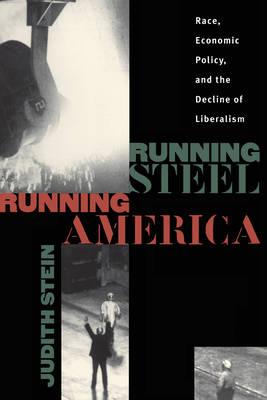
Door een staking bij bpost kan je online bestelling op dit moment iets langer onderweg zijn dan voorzien. Dringend iets nodig? Onze winkels ontvangen jou met open armen!
- Afhalen na 1 uur in een winkel met voorraad
- Gratis thuislevering in België vanaf € 30
- Ruim aanbod met 7 miljoen producten
Door een staking bij bpost kan je online bestelling op dit moment iets langer onderweg zijn dan voorzien. Dringend iets nodig? Onze winkels ontvangen jou met open armen!
- Afhalen na 1 uur in een winkel met voorraad
- Gratis thuislevering in België vanaf € 30
- Ruim aanbod met 7 miljoen producten
Zoeken
Running Steel, Running America
Race, Economic Policy, and the Decline of Liberalism
Judith Stein
Paperback | Engels
€ 76,45
+ 152 punten
Omschrijving
The history of modern liberalism has been hotly debated in
contemporary politics and the academy. Here, Judith Stein uses
the steel industry--long considered fundamental to the U.S.
economy--to examine liberal policies and priorities after World
War II. In a provocative revision of postwar American history,
she argues that it was the primacy of foreign commitments and the
outdated economic policies of the state, more than the nation's
racial conflicts, that transformed American liberalism from the
powerful progressivism of the New Deal to the feeble policies of
the 1990s.
Stein skillfully integrates a number of narratives usually
treated in isolation--labor, civil rights, politics, business,
and foreign policy--while underscoring the state's focus on the
steel industry and its workers. By showing how those who
intervened in the industry treated such economic issues as free
trade and the globalization of steel production in isolation from
the social issues of the day--most notably civil rights and the
implementation of affirmative action--Stein advances a larger
argument about postwar liberalism. Liberal attempts to address
social inequalities without reference to the fundamental and
changing workings of the economy, she says, have led to the
foundering of the New Deal state.
contemporary politics and the academy. Here, Judith Stein uses
the steel industry--long considered fundamental to the U.S.
economy--to examine liberal policies and priorities after World
War II. In a provocative revision of postwar American history,
she argues that it was the primacy of foreign commitments and the
outdated economic policies of the state, more than the nation's
racial conflicts, that transformed American liberalism from the
powerful progressivism of the New Deal to the feeble policies of
the 1990s.
Stein skillfully integrates a number of narratives usually
treated in isolation--labor, civil rights, politics, business,
and foreign policy--while underscoring the state's focus on the
steel industry and its workers. By showing how those who
intervened in the industry treated such economic issues as free
trade and the globalization of steel production in isolation from
the social issues of the day--most notably civil rights and the
implementation of affirmative action--Stein advances a larger
argument about postwar liberalism. Liberal attempts to address
social inequalities without reference to the fundamental and
changing workings of the economy, she says, have led to the
foundering of the New Deal state.
Specificaties
Betrokkenen
- Auteur(s):
- Uitgeverij:
Inhoud
- Aantal bladzijden:
- 432
- Taal:
- Engels
Eigenschappen
- Productcode (EAN):
- 9780807847275
- Verschijningsdatum:
- 5/10/1998
- Uitvoering:
- Paperback
- Formaat:
- Trade paperback (VS)
- Afmetingen:
- 155 mm x 234 mm
- Gewicht:
- 612 g

Alleen bij Standaard Boekhandel
+ 152 punten op je klantenkaart van Standaard Boekhandel
Beoordelingen
We publiceren alleen reviews die voldoen aan de voorwaarden voor reviews. Bekijk onze voorwaarden voor reviews.











